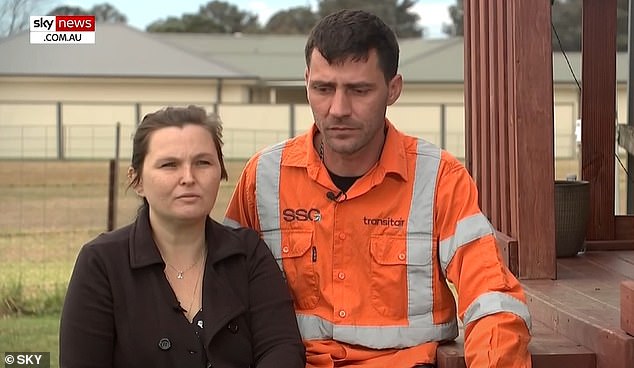The medical regulator is being urged to rule that NHS strikes are ‘incompatible’ with doctors’ duty to protect patients.
The General Medical Council (GMC) is facing calls to review its guidelines for practitioners following the latest walkout by resident doctors.
Amid an ongoing row over pay, resident doctors – formerly known as junior doctors – have just staged a five-day strike to bring huge disruption to the NHS in England.
The British Medical Association (BMA), the union behind the walkout, has refused to rule out further strikes if the Government doesn’t meet their demands.
The GMC is now under pressure to take ‘immediate’ steps to prevent a further walkout.
In a letter to the regulator, Tory shadow health secretary Stuart Andrew has told the GMC to review its ‘Good Medical Practice’, which doctors are expected to abide by.
This sets out the principles, values and standards expected of all doctors, and includes ‘making the care of patients the first concern’.
The Conservatives want the GMC to look again at the guidelines with ‘a view to make striking incompatible with Good Medical Practice’.
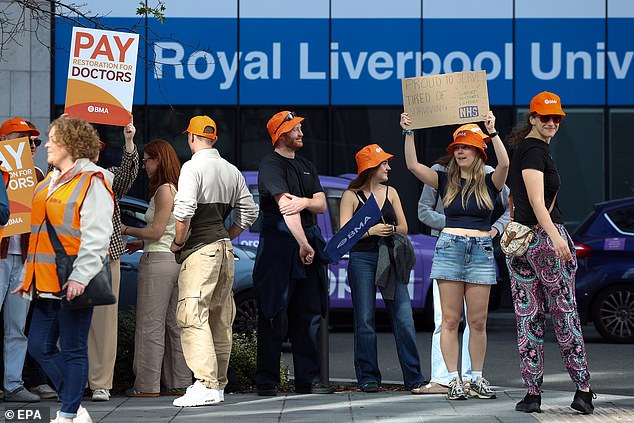
Striking resident doctors hold up placards during a picket outside the Royal Liverpool University Hospital last week
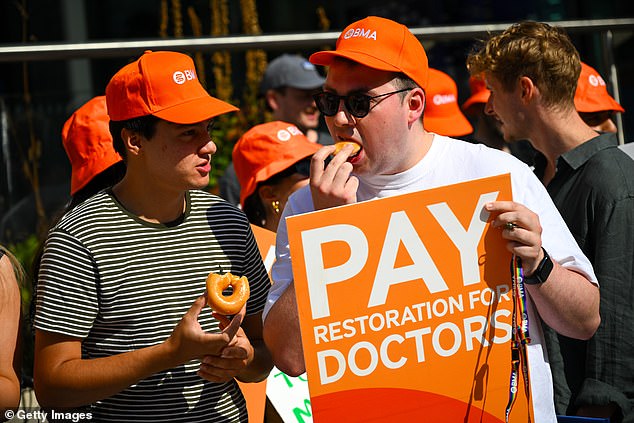
The British Medical Association (BMA), the union behind the recent walkout by resident doctors, has refused to rule out further strikes if the Government doesn’t meet their demands
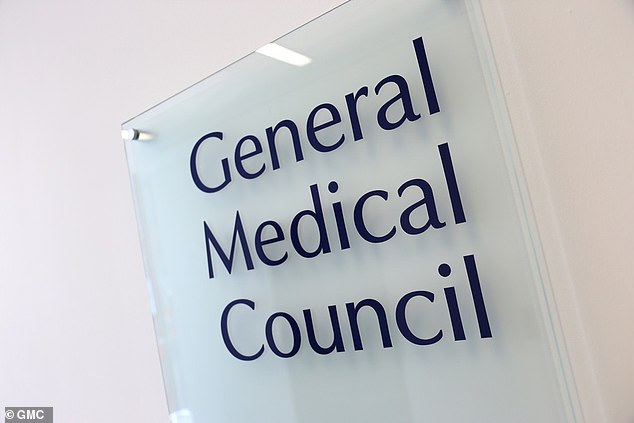
The General Medical Council is being urged to rule that NHS strikes are ‘incompatible’ with doctors’ duty to protect patients.
Tory leader Kemi Badenoch has already pledged to ban doctors’ strikes if the Conservatives return to power.
She vowed to introduce legislation to block medics from taking widespread industrial action, placing the same restrictions on them that apply to police officers and soldiers.
The Tory plans would see minimum service level requirements – which were brought in for some sectors by the previous government and scrapped by Labour – introduced across the health service.
But, in his letter to GMC chief executive Charlie Massey, Mr Andrew said that ‘action is needed now’ to protect NHS patients while legislative measures are formulated.
He wrote: ‘Our proposals require new primary legislation, particularly relating to the Trade Union and Labour Relations (Consolidation) Act 1992.
‘If the Government will not make these changes, patients will be condemned to four more years of disruptive strikes. Conservatives believe that action is needed now.
‘Given the reckless approach the BMA has taken, warning that the recent strikes may even cause harm to patients, we believe that in response the GMC must review Good Medical Practice with a view to make striking incompatible with Good Medical Practice.
‘This would have the immediate effect of preventing further strikes while legislative measures were formulated and ensure patients and their safety remain at the core of Good Medical Practice.
‘We hope that the GMC can stand with us in protecting the health of patients upholding the fundamental duty of care of the NHS.’
A GMC spokesperson said: ‘Doctors are legally entitled to take part in lawful industrial action, including strike action.
‘During strike action, doctors’ employers will have a vital role in planning and preparing for how patients will be cared for.
‘They play an important part in maintaining the continuity of patient care to the highest possible standard.
‘We expect any doctors choosing to take part in strike action to continue to follow the principles of our guidance, Good Medical Practice.
‘It highlights the importance of doctors working collaboratively with the healthcare team to keep patients safe, staying within the limits of their competence.’
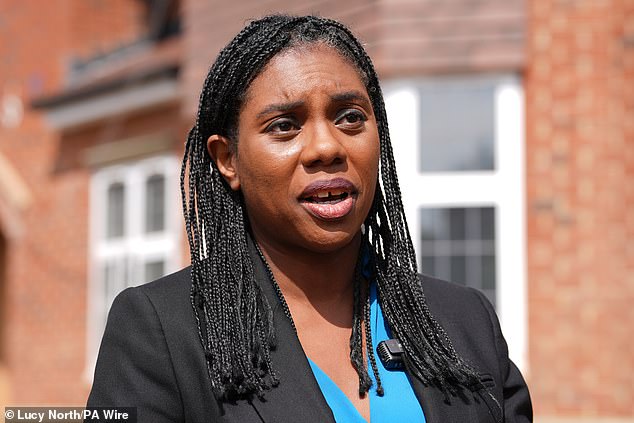
Tory leader Kemi Badenoch has already pledged to ban doctors’ strikes if the Conservatives return to power
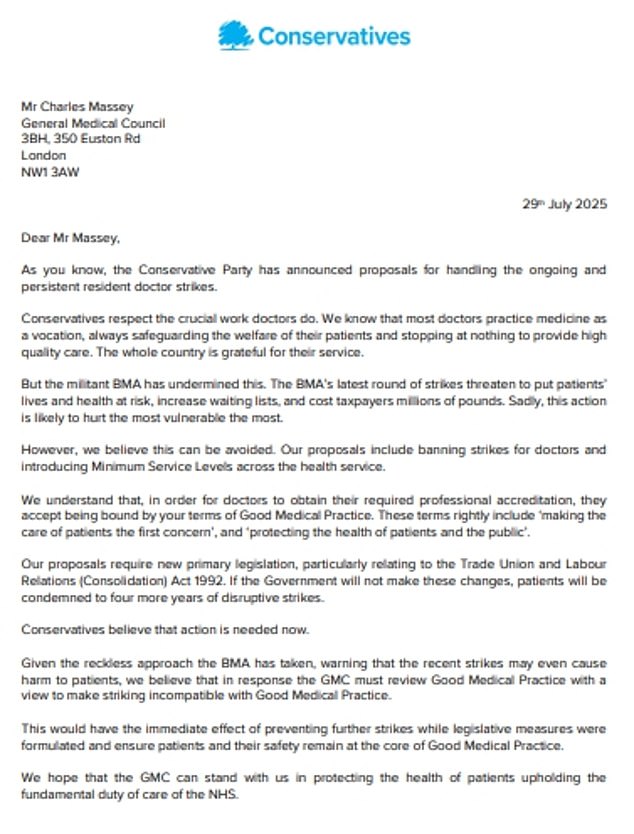
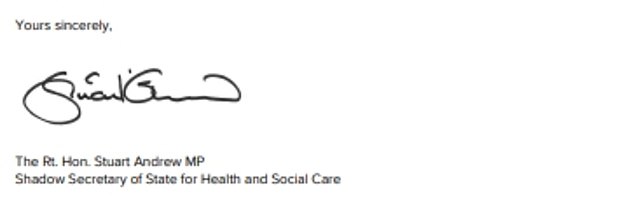
But, in a letter to GMC chief executive Charlie Massey, shadow health secretary Stuart Andrew said ‘action is needed now’ to protect NHS patients while legislative measures are formulated
Both the Labour Government and BMA have said they are prepared to continue negotiations with a view to avert further strike action.
Health Secretary Wes Streeting said talks could lead to improvements in the working lives of resident doctors but he has repeatedly said there is no more money for pay.
But BMA leaders have insisted that there must be some pay discussions during talks.
The BMA has also launched a ‘linked dispute’ with the Government over a lack of places for doctors in training, which could lead to common ground during future talks.
The BMA has branded the Tory pledge to ban doctors’ strikes if they return to power as ‘a desperate intervention from a party that spent nearly 15 years failing the NHS’.
Dr Tom Dolphin, BMA chair of council, said: ‘Threatening to ban strike action is not the right response for a modern democracy.
‘Doctors aren’t militants – they’re professionals sounding the alarm about a health service in crisis. Silencing them won’t fix the NHS. Listening to them might.
‘Patients are having operations or appointments postponed every single day in the NHS due to understaffing and lack of beds, and undervaluing staff contributes to that.
‘Doctors have a human right to strike just like everyone else. If something is wrong, you don’t ban the canary in a coalmine from singing.
‘Striking is always the last resort and should never be used lightly, but fundamentally the right to strike should always be there.’
He added: ‘The BMA and NHS England have in place an agreed national ‘derogations’ process whereby hospitals can request to have specific striking doctors return to work in the event of an unforeseen emergency or mass casualty event.
‘That process is there day and night throughout industrial action, and we remain ready to respond to any emergency requests.
‘However, we need to be clear that the purpose of this agreement is not to facilitate the continued delivery of non-urgent care.’
Health Secretary Wes Streeting said: ‘As we come to the end of five days of strike action by resident doctors, I want to once again thank all NHS staff for the incredibly hard shift put in to care for patients.
‘We made the decision to cancel as little planned care as possible this year, and thanks to their tireless work it’s clear that far more patients have got the care they need than in previous years.
‘That said, all industrial action comes with a level of disruption, and I feel angry and frustrated on behalf of those patients who didn’t get the service they expect due to these strikes.
‘We’ve cut waiting lists to their lowest level for two years and I thank those NHS staff who will now be working hard to make sure we don’t lose the progress we’ve made in fixing our NHS.
‘That is why my door is open to the BMA leadership to resume the talks we were having last week, before they walked out.
‘After a 28.9 per cent pay rise over the last three years, we simply cannot go further on pay this year, but there are real improvements to resident doctors working lives we can work hand in hand to make – from training positions to career progression and beyond.
‘After over a decade of being let down, resident doctors deserve better than their current working conditions, ebbing support from the public, and a seemingly intractable position from the BMA leadership – especially given a majority of them didn’t vote for this strike action.
‘I stand ready to continue our discussions. Our shared ambitions will reap rewards for both patients and staff but they can only be achieved if we work together.’


